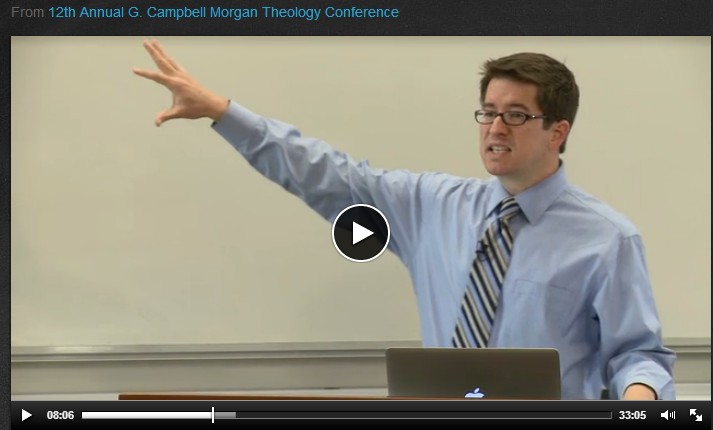
For twelve years, the Torrey Honors Institute has organized the G. Campbell Morgan Theology Lectures, a ten-hour overview of the major doctrines of systematic theology. It’s designed for Torrey freshmen and sophomores who have been immersed in primary texts from the history of theology: Athanasius, Augustine, Anselm, Aquinas, and even a few authors whose names don’t start with A (Irenaeus, Gregory of Nazianzus, Bonaventure, Luther, Calvin, Bunyan). The basic idea is that since these students in Biola’s great books program are getting the actual content of Christian theology from primary sources (including of course Scripture, the greatest great book and most primary of primary sources!), a flyover survey of the entire scope of systematic theology will help them get their bearings.
The resulting lectures, however, are also a great resource in their own right. We have eight Biola theologians (some from Talbot School of Theology, some from Talbot’s undergraduate Bible department, and some from Torrey Honors Institute) introducing topics within their teaching specialties. I’ve observed or participated in this event for a dozen years, and I’m always delighted at how each teacher approaches their topic differently, yet the whole system holds together in a remarkably unified way. (By the way, the montage above is the lineup from 2010, which is mostly the same as 2012. Most of us just look a tiny bit older now.)
This year we broke the series up into half-hour lectures, more or less, for easier viewing or listening online. Here they are, thanks to help from open.biola.edu/, along with a few quotes from the accompanying livetweet that I ran with the hashtag #MorgTheo.
Team quarterback Erik Thoennes carries the ball for the first two hours. He starts us with a hymn (Be Thou My Vision), and then explains the nature of theology. A couple of quotations: “If you’ve come up with a doctrine on your own, you’re wrong.” “Whenever you give a good summary answer about what’s in the Bible, you’re doing a little bit of systematic theology.”
Erik Thoennes again on the doctrine of Scripture: “I used to ignore the human element of Scripture, so text crit, canonicity, & the synoptic problem freaked me out.”
Erik Thoennes wraps up the doctrine of Scripture and explains theological method overall: “You come to the Bible not only to strengthen your beliefs, but also to weaken your belief in other things.”
Rob Price on the doctrine of God and creation. “Here’s the problem for Arius: Jesus. If Jesus is a problem for your theology, your theology stinks.”
“Note it’s heretics, not trinitarians, who bring in philosophical presuppositions of absolute transcendence & oneness.”
Rob Price again on the doctrine of providence that flows from the Christian view of the God-world relationship. “God is closer than pantheism thinks and further than deism thinks. The truth isn’t between those two errors.” And on the Trinity: “The Father initiates, the Son mediates, & the Spirit perfects. How do these roles relate to who they are eternally?”
Matt Jenson‘s videos for some reason won’t embed from Youtube. Don’t click on this:

I warned you. Instead you’ll have to click through to Open Biola to hear Jenson. Here he is on the nature of humanity: “We come to Jesus to learn about God, but also to learn about ourselves.” and “Until Christ returns & our real lives revealed, true humanity is homo absconditus, hidden humanity.”
Matt Jenson on sin as turning in on yourself: “Relationlessness is not only inadvisable, it’s impossible.” and “As sinners, we use God & his creation so we can enjoy ourselves. We glut on ourselves.”
Fred Sanders on the two natures of Christ:
Fred Sanders on the one person of Christ:
(I wanted ace Christologians Ashish Naidu or Rob Lister to do this lecture, but both of them were out of town that weekend. If you want to hear Ashish’s lecture from last year, check it out here. One of the great things about staffing a series of theology lectures at Biola is that we’ve got a deep bench of theology teachers. When scheduling, I run out of lecture spots before I run out of speakers, and never get to use everybody I want students to hear from.)
John McKinley on the identity of the Holy Spirit: “The work of the Spirit is very Jesus-focused. There is a pattern of Word & Spirit working together throughout.” “Jesus, filled with the Spirit, is a model for us.”
https://www.youtube.com/watch?v=l4PtZmgvPBM&list=SPVHY3HvnI6yNtal11fPQZG3rc3uQ-LTKd&index=10
John McKinley traces the work of the Holy Spirit: “Spirit-filling happens to Peter 5 times just in the opening chapters of Acts. We don’t want to say he’s leaking.”
Fred Sanders on the doctrine of salvation as an accomplished reality in Christ. But first Sanders struggles with his computer annoyingly for a while:
Fred Sanders on salvation applied by the Holy Spirit:
Greg Peters on the marks of the church: “The church is holy like Christians are holy: as set apart by God’s declaration. The holy church is a sinful church.”
Greg Peters on the nature and purpose of the church: “You need to be involved in a church. A real one. Not your friends in the woods sometimes.” “College is not a time to experiment with non-church-attendance.”
Joanne Jung on sanctification. There are visual aids. Hayley gets into the Trinity. It all works.
Joanne Jung on spiritual formation: She reports a student saying “I spend so much time in supplication that I have never learned how to adore God.”
Mark Saucy on cosmic and personal eschatology: “The theme of history and eschatology is the recapitulatio of God’s Reign over his creation through his human vice-regents.”
Mark Saucy on the Kingdom of God and eschatology: “It’s the comprehensive answer to every theology question. Really. Just say ‘the glory of God.'” “Humanity is the highest thing created, but Sabbath is the climax of the story.”